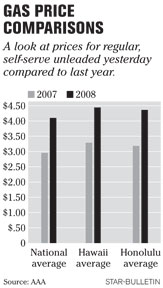CRAIG T. KOJIMA / CKOJIMA@STARBULLETIN.COM
William Pierpont, manager of the state Agriculture Department's Measurement and Standards Branch, shows some equipment used to test gas pumps for accuracy.
|
|
Isle pumps measure up, state says
Local service stations have a good record of selling gas at the volume they advertise
STORY SUMMARY »
The price of unleaded gasoline hit another record high statewide and in Honolulu yesterday.
With gas prices continuing to rise, some motorists are counting every drop of fuel and want to make sure they are getting what they pay for.
But the state worker in charge of making sure gas pumps are accurate says there's no need to worry. You're actually more likely to get more gas for your dollar than less.
That's good news when you are paying an average $4.453 per gallon statewide and $4.362 in Honolulu, according to the AAA's daily report.
FULL STORY »
Fear not, wary motorist.
When you pay $121.80 to fill up the 28-gallon tank in your sport utility vehicle, chances are you get exactly what you paid for, maybe more.
 As gas prices climb ever higher, some states have seen more and more complaints about potentially faulty gas pumps, as consumers worry about getting cheated out of any amount of fuel.
As gas prices climb ever higher, some states have seen more and more complaints about potentially faulty gas pumps, as consumers worry about getting cheated out of any amount of fuel.
In Hawaii, the man in charge of oversight of gas pumps across the state says that's probably not happening here.
"We don't find cheating," said William Pierpont, manager of the Measurement and Standards Branch within the state Department of Agriculture. "We have never found -- in the six years that I've been manager -- a pump like that ... a pump or a station where fraud has been committed."
"In fact, "statistically, gas pumps tend to give away more fuel than is registered on the meter itself," he added. "That's just the nature of the device."
"Getting the correct amount of fuel from a pump has become a concern for both motorists and gas station owners as prices soar past $4 a gallon.
Hawaii's statewide average for regular self-serve unleaded reached a record high of $4.453 a gallon yesterday. The Honolulu average also hit an all-time mark yesterday, at $4.362, according to AAA's daily fuel gauge report.
The Measurement and Standards Branch, part of the Agriculture Department's Quality Assurance Division, has the responsibility of registering and inspecting all commercial measuring devices, including gas pumps, scales and taxicab meters.
For fiscal year 2007, there were 7,050 gas pumps registered with the branch on all islands.
Of the 1,349 that were tested that year, 86 percent were found to be "in compliance" for accuracy, Pierpont said.
More often than not, a noncompliant pump probably is giving away gas.
"As the device wears, fuel tends to slip around the meter and they end up delivering more fuel than is registered on the meter," Pierpont said.
The state does not require meters be inspected annually, only that they be registered with the Measurement division. But as part of the registration, owners must submit that a device is in proper working order.
Having a gas pump properly maintained is simply a smart business decision, said Terry McBarnet, president of Lanai Oil Co.
McBarnet said he has the pumps at his business calibrated annually by a third party.
"If you look at it strictly from self-interest, there's no reason why (the pumps) should be go one way or the other," he said. "So you're better off just having them accurate."
"M. Nakai Repair Service in Honolulu is among the independent companies that calibrates devices such as gas pumps. Jhony Guzman, the company's maintenance supervisor, said more gas station owners appear to be keeping close tabs on their pumps.
"They are pretty concerned about the amount of fuel (being delivered)," he said. "They see any small amount of discrepancy there they pretty much call us and have us check."
"Pierpont said one of his main concerns is the inability to inspect more pumps, due to lack of resources.
The branch has 15 full-time positions to carry out inspections of all devices on all islands. He is recruiting and interviewing for an inspector on Maui, and acknowledges that the lack of staff has led to some pumps that have gone uninspected for almost two years.
He noted that the branch recently completed a regular inspection of taxicab meters, only to have the City Council impose a rate change soon thereafter.
"We've got to inspect another 2,000 taxis," Pierpont said. "When we come into the office and there's a lineup of 70 taxis that need to be inspected, it's hard to check fuel pumps."

